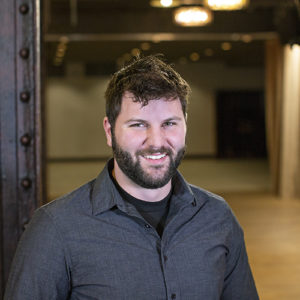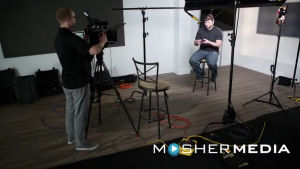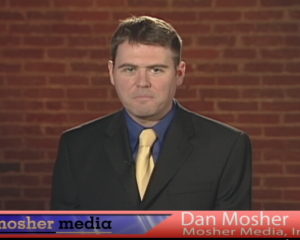How to Bring Out the Best in Your Guest
If you’re making a video where someone speaks on camera without a script, you need great interviews. Whether your goal is marketing, education, or journalism, your interviews have to be genuine on the first take because you only get one shot at authenticity.

In our last post, veteran producer Bud Graske laid out the rules for producers in pre-production. Today, we’ll discuss the interview itself.
For that, we’ll draw on more wisdom from Bud as well as a conversation with Nick Haidet, a producer whose wedding business depends on capturing authentic, personal interactions in a setting that’s always time constrained.
Here’s what we learned.
1. Hurry up and slow down.
After the hustle of setting up a shoot, it’s time to relish the rewards of your preparation. Time may be precious on set, but anyone not used to being on camera needs time to adjust.
Bud starts by telling his guest he’s not there for scripted answers, and that he may ask a question twice to get a more concise, rephrased answer — or extra footage to make editing easier.
“Take as much time as they’ll give you and find the gold, because it’s there,” Bud said. “Your interviewee will tell you what excites him, and all you have to say is ‘that’s interesting. Tell me more.’ Then you’re in.”
Nick breaks the ice with some softball questions.
“I start with questions about stuff I have no intention of using,” he said. “Their life, their job. You want to connect with them however you can.”
The added benefit of this approach is it gives Nick a sense for what kind of speaker the guest is. If the answer goes on too long, Nick gets a chance to point it out before the interview even starts.
2. Don’t mind the camera.
There are technical tricks for easing into your interview, too. There’s no need for your equipment to remind a guest she’s on camera once she’s eased into comfortable conversation with the host.
Nick turns off the red tally light on the front of each camera so the guest doesn’t get a visual cue when recording begins. And he and Bud both speak in code with their crew.

“As the guest is sitting down and getting comfortable, and the interviewer is doing warm-up questions, you may get something useful,” Nick said. “Then hopefully after a few minutes, when the host asks, ‘All right, are we rolling?’ you’ll already have three minutes of footage.”
Bud and Nick each know a camera operator who sometimes likes to ask for a retake during an interview and will blame himself for setting up the shot incorrectly. The retake is actually just to give the guest an opportunity to rephrase an answer without drawing attention to it.
“It all comes down to making the subject comfortable,” Bud said.
3. Keep in touch.
You need to make a connection with your guest early on, then maintain it throughout the interview. There are two reasons:
- Better personal connection between host and interviewer = better interview
- It really matters where your guest is looking. An interview guest shouldn’t be looking around the room, at other crew members, or directly into the camera lens. Ever.
Here are two ways to get it right:
- Whoever conducts the interview needs to sit next to the camera, not behind it.
- Then, tell the guest to look at and address the interviewer just as though you’re having a normal conversation and the lights and cameras aren’t there. Most guests will look for validation while speaking, so make sure they look at you.
“It’s one of the few times in life you can hold eye contact with someone that long and not freak them out,” Bud said. “And if you look down at your notes while someone is answering, they’ll look to your sound guy for validation.”
Bud also stressed the importance of listening actively to your guests’s answers. That sounds obvious, but it can be easy to forget while the cameras are rolling. Not only does good listening maintain the rapport you’ve built, it also makes for better interviews.
“The best stuff you get is going to be from follow-up questions,” Bud said.


